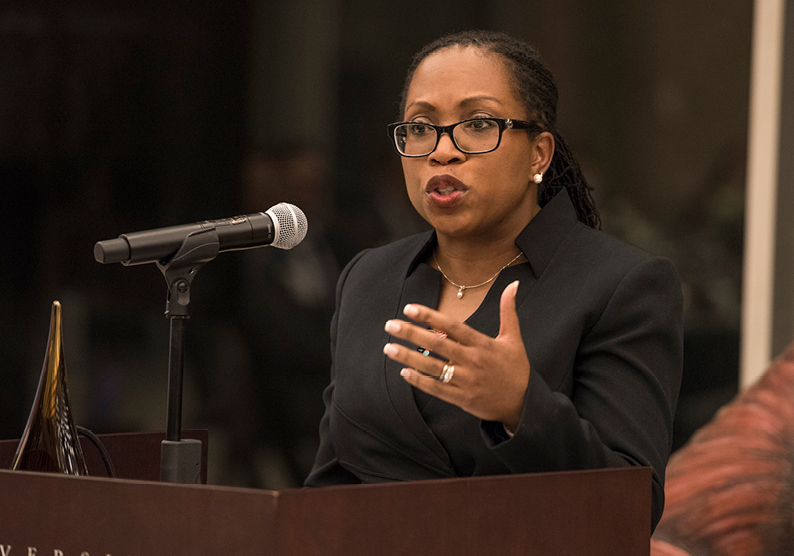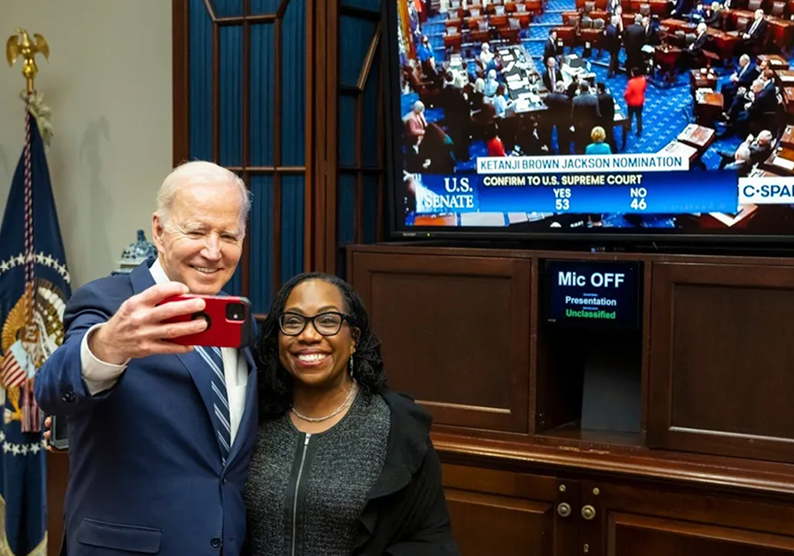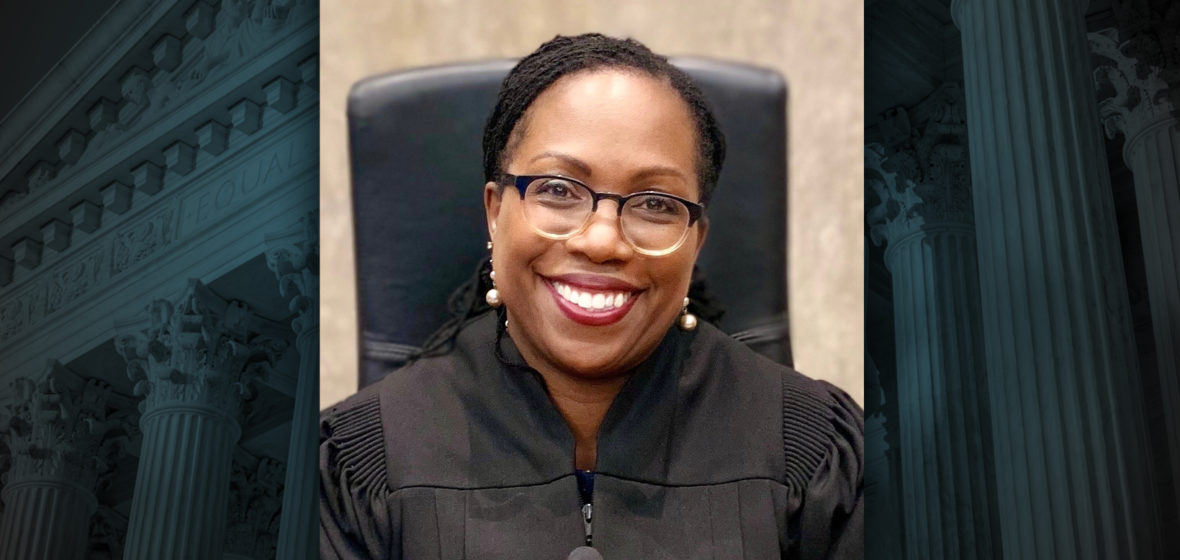The road to confirmation of Ketanji Brown Jackson as the first African-American woman on the United States Supreme Court was never going to be easy, writes Ray Steinwell
The United States Senate in April confirmed President Joe Biden’s nominee, Ketanji Brown Jackson, as the first African-American woman on the United States Supreme Court in its 233-year history.
Biden announced his intention to nominate an African American woman to the Supreme Court during the 2020 Presidential campaign. On his first day in office, he signed an Executive Order committing the administration to policies advancing equity, civil rights, racial justice and equal opportunity.
Announcing Jackson’s nomination, the White House said:
“President Biden sought a candidate with exceptional credentials, unimpeachable character, and unwavering dedication to the rule of law. He also sought a nominee—much like Justice Breyer—who is wise, pragmatic, and has a deep understanding of the Constitution as an enduring charter of liberty. And the President sought an individual who is committed to equal justice under the law and who understands the profound impact that the Supreme Court’s decisions have on the lives of the American people.”
Despite the commitment, the road for Jackson was never going to be easy. After her nomination, in a podcast titled ‘Only Black Women Need Apply’, Senator Ted Cruz said the promise of a black appointment was “offensive.” Senator Roger Wicker described any black women who filled the role as a “beneficiary” of affirmative action, implying that the appointment of any African American woman could never be on merit.
In the week leading up to the Senate confirmation hearings, Senator Lindsay Graham signaled that race would feature prominently: “On our side, it’s about we’re all racist, if we ask hard questions. It’s not going to fly with us. We are used to it by now, at least I am. So, it’s not going to matter a bit to any of us. We’re going to ask what we think you need to be asked.”

And so, it was.
Over four days, three with Jackson present to answer questions, the United States and the world watched the shameful display that was Jackson’s confirmation hearing.
For some on the Senate Committee like Cruz, the hearing was never about trying to understand the character of the person who would be the first female African American justice on the Supreme court. Although that is the purpose of confirmation hearings, this was all about race, despite Cruz mentioning twice in his introduction that “it’s not about race.”
He and Senator Marsha Blackburn then moved onto critical race theory. The theory discusses racism and power and the foundations of society that perpetuate racism. At the hearing, Cruz held up an illustrated children’s book titled ‘Antiracist baby’, a book that invites early conversations about anti-racism and asked Jackson, “do you agree with this book that is being taught to kids that babies are racist?”
Cruz questioned Jackson “If you look at Georgetown Day’s curriculum [a high school at which Jackson serves on the Board] it is filled with critical race theory.”
“I do not believe that any child should be made to feel as though they are racist or though they are not valued,” Jackson said, noting that “the board does not control the curriculum.”
Cruz also questioned Jackson about a reference to the 1619 project in a speech she delivered in 2020 at the University of Michigan. The 1619 project is a work which examines the country’s history through the prism of slavery.
“It is not something that I’ve studied. It doesn’t come up in my work,” Jackson said.
Graham moved on to challenge Jackson’s patriotism. “We hold enemy combatants as long as they are a threat – Do you support the idea that indefinite detention of an enemy combatant is unlawful?”
He seemed outraged Jackson took an amicus brief to defend enemy combatants in Guantanamo Bay when she was a public defender. As she rightly responded, “lawyers represent clients”, whomever they may be.
Cruz and Blackburn pressed Jackson on how she would asses gender, Blackburn asking, “Can you provide a definition for the word ‘woman’?” and Cruz asking a variation of the same question.
Cruz spent a considerable part of his allotted time on Jackson’s sentencing in child pornography cases, the implication she was too easy on defendants. He held up an enormous poster with the cases tried by Jackson and proceeded to ask her to justify her sentence in each case.
All the while Jackson maintained a calm respectful demeanor which demonstrated, among her other qualifications, why she is immensely suited to the role.
Jackson was born in Washington, D.C. and grew up in Miami, Florida. Her parents attended segregated primary schools in the South then attended Black Colleges and Universities. Jackson graduated magna cum laude from Harvard College, then attended Harvard Law School (as did Cruz), where she was an editor of the Harvard Law Review and graduated cum laude. She was a former clerk for Justice Breyer, whom she replaces on the bench.

Jackson has worked as a public defender representing low-income criminal appellants. She was also vice chair of the United States Sentencing Commission.In 2013 Jackson was appointed by former President Barack Obama to the United States district court for the district of Columbia. Last year Biden appointed Jackson to the highly influential Court of Appeals for the District of Columbia, which presides over Washington D.C.
Jackson’s nomination is part of a series of recent diverse appointees by the Biden administration. Last year Biden secured the confirmation of two other African American women – Candice Jackson- Akiwumi to the Court of Appeals for the seventh circuit and Tiffany Cunningham to the Court of Appeals for the Federal Circuit. Only eleven African American women have been appointed to fill 838 vacancies on the federal courts since 1789.
Biden also secured the confirmation to the District Court of Zahid Quraishi, a son of Pakistani immigrants as the first Muslim federal judge in United States history; and Jennifer Sung as appointee to the California-based Court of Appeals for the ninth circuit who is the first Asian-American Pacific Islander to serve on that court. Shalina Kumar was appointed to serve on the United States District Court for the District of Michigan. She is the first federal judge of South Asian descent to serve on that court. Patricia Tolliver Giles has been appointed to the District Court for the District of Virginia. Giles is only the second woman of color to serve on the Virginia federal bench. Armando Bonilla was recently appointed to the Court of Federal Claims. He is the first Hispanic judge to serve on that court.
What is remarkable about Jackson and the other appointments is not just their colour, as novel as that is, but the diversity of experience they bring to the bench. In these appointments Biden has departed from the practice in the United States and in Australia of appointing only attorneys (counsel) or prosecutors, favouring civil rights lawyers, public defenders and others working within the broader legal system.
Meanwhile, back in Australia, the statistics make one despair. No person of colour (Indigenous or otherwise, male or female) has ever been appointed to Australia’s High Court in its almost 120-year history.
It appears (because we don’t collect statistics like other countries) only one person of color has been appointed to the Federal Court in its 46-year history; less than 1 per cent (or about 5 out of a total of almost 500 judges) across the NSW and Victorian Supreme courts and less than 1 per cent across the lower courts in Australia.
Asian Australians for example comprise only 3.1 per cent of partners in law firms and 1.6 per cent of the national bar despite Asian Australians representing 10 per cent of the population and a significant number of students at law school.
The lack of colour is not limited to the judiciary as dire as that is. A 2018 Human Rights Commission Report found that 95 per cent of senior leaders in Australia are white; 0.4 per cent indigenous and less than 5 per cent are non-European.
The causes and solutions to Australia’s judicial diversity crisis is beyond this article, but well known. Stated simply, we don’t maintain statistics on cultural diversity, we have no independent selection panels, or since 2013, any panels for Federal Court appointments like other Commonwealth countries and most of all there does not seem to be any willingness or urgency to address the issue, despite numerous calls, including from former judges.
As unedifying as Jackson’s nomination process was, it forced the United States to confront issues of race and inequality that define that nation’s recent history. In Australia’s case we are decades behind even beginning those difficult conversations on race, power and privilege that must be had.




